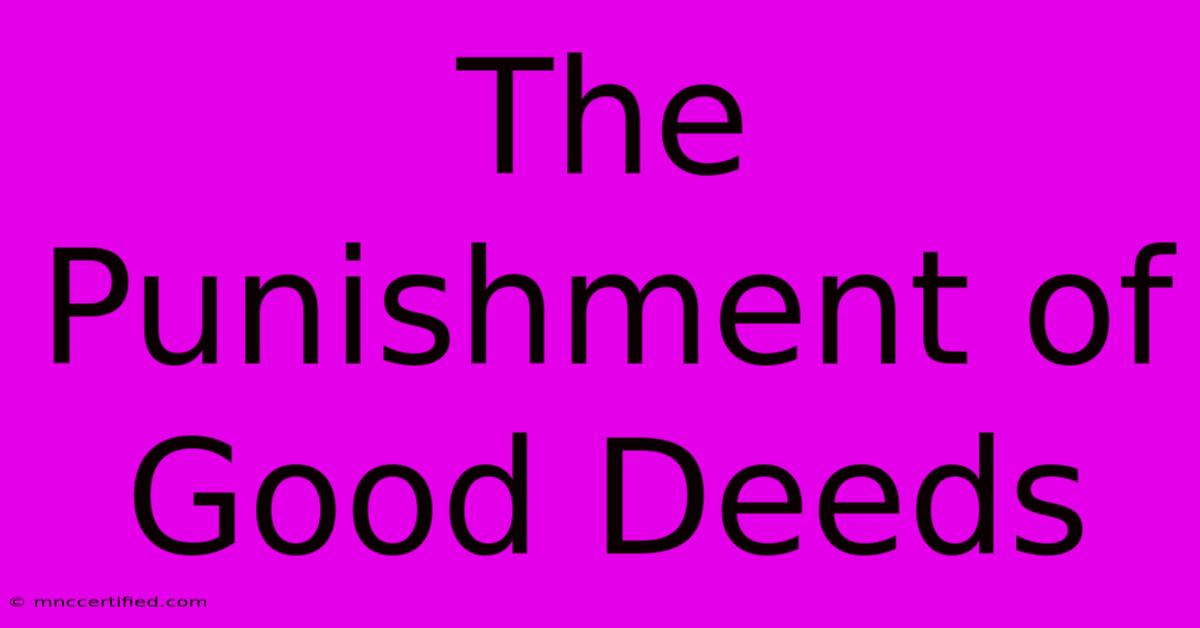The Punishment Of Good Deeds

Table of Contents
The Punishment of Good Deeds: An Exploration of Paradox and Irony
The phrase "the punishment of good deeds" evokes a sense of profound injustice, a paradox that resonates across cultures and throughout history. It speaks to the frustrating reality that seemingly virtuous actions can sometimes lead to unforeseen and negative consequences. This isn't about karma in a simplistic sense, but rather a deeper exploration of the complex interplay between intention, action, and outcome. This article will delve into the various reasons why good deeds can be punished, exploring the psychological, social, and even philosophical implications.
Why Good Deeds Can Backfire: Unintended Consequences
One of the primary reasons good deeds can be "punished" is the existence of unintended consequences. We often act with the best of intentions, striving to improve a situation or help someone in need. However, the complex web of interconnected factors within any system can lead to outcomes vastly different from what we anticipated.
-
The Law of Unintended Consequences: This principle highlights how even well-meaning interventions can have unforeseen and negative ripple effects. For instance, offering financial aid to a struggling family might inadvertently disincentivize them from seeking employment, or providing free healthcare to a community might overwhelm the existing system.
-
Misinterpretation and Mistrust: Good deeds, if not properly understood or communicated, can be misinterpreted. A generous act might be perceived as condescending or manipulative, leading to resentment rather than gratitude. This is particularly true in situations where power dynamics are at play.
-
The Backlash Effect: Sometimes, doing good can lead to a backlash from those who feel threatened by the change you're trying to implement. This is often seen in social activism and reform movements, where those benefiting from the status quo might actively resist positive change.
The Psychological Toll of Good Deeds
The emotional burden of doing good shouldn't be underestimated. While altruism is generally seen as positive, it can also lead to:
-
Burnout and Exhaustion: Constantly striving to help others can be emotionally and physically draining. This is especially true for individuals working in helping professions like social work, healthcare, and teaching. Ignoring self-care can lead to burnout and reduced effectiveness.
-
Exploitation: Individuals who are consistently generous and helpful can become targets for exploitation. Others might take advantage of their kindness, leading to feelings of resentment and frustration. Setting healthy boundaries is crucial to avoid this.
-
Guilt and Self-Doubt: Even when acting with the best intentions, there's always a chance that our efforts will fall short or fail to achieve the desired outcome. This can lead to feelings of guilt, inadequacy, and self-doubt.
The Societal Perspective: Good Deeds and Social Structures
The concept of "punishment" in the context of good deeds is also influenced by broader societal structures and power dynamics.
-
Systemic Injustice: Good deeds performed within a system characterized by systemic injustice might be rendered ineffective or even exacerbate existing inequalities. For example, charitable donations might simply reinforce the structures that perpetuate poverty.
-
Social Norms and Expectations: Societal expectations and norms can shape how good deeds are perceived and rewarded. What is considered a good deed in one culture might be viewed negatively in another.
-
Lack of Recognition and Appreciation: Sometimes, good deeds go unnoticed or unappreciated, leading to feelings of disillusionment and demotivation. This highlights the importance of recognizing and celebrating acts of kindness and altruism.
Navigating the Paradox: Strategies for Effective Altruism
Despite the potential for negative outcomes, the pursuit of good deeds remains essential. To mitigate the risk of "punishment," consider these strategies:
-
Careful Planning and Assessment: Before taking action, carefully assess the potential consequences of your actions. Seek diverse perspectives and consider the potential unintended effects.
-
Building Trust and Relationships: Establishing trust and building strong relationships with the community you're trying to help can foster a better understanding and minimize the risk of misinterpretation.
-
Prioritizing Self-Care: Maintaining your own well-being is crucial. Engaging in self-care practices helps prevent burnout and ensures you can continue to make a positive impact.
-
Focusing on Systemic Change: Addressing systemic issues and inequalities is crucial for creating long-term positive change. Focusing solely on individual acts of charity might not be enough.
The "punishment of good deeds" is a complex and nuanced phenomenon. By understanding the underlying factors, we can strive to maximize the positive impact of our actions while minimizing the risk of unintended consequences. It's a reminder that genuine altruism requires not only good intentions, but also careful consideration, strategic planning, and a commitment to self-care.

Thank you for visiting our website wich cover about The Punishment Of Good Deeds. We hope the information provided has been useful to you. Feel free to contact us if you have any questions or need further assistance. See you next time and dont miss to bookmark.
Featured Posts
-
Hospital Christmas For Max George
Dec 13, 2024
-
Game Awards 2024 Full Winners List
Dec 13, 2024
-
Trump Picks Lake For Voa Director
Dec 13, 2024
-
Satch Vai Band 2025 Uk Europe Tour
Dec 13, 2024
-
Gukesh New Youngest Chess Champion
Dec 13, 2024